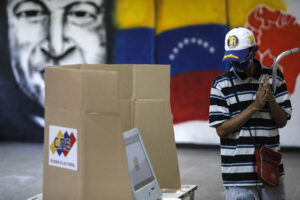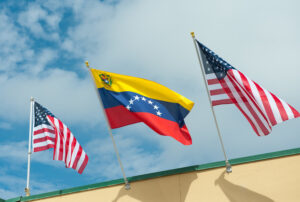WOLA and SAIS are pleased to invite you to a discussion on
Venezuela: What Can Be Done?
Featuring
Margarita López Maya
Professor Emeritus, Centro de Estudios de Desarrollo, Universidad Central de Venezuela
Luis Vicente León
Director, Datanalisis
and
Francisco Rodríguez
Chief Economist, Torino Capital LLC
Moderated by
David Smilde
WOLA Senior Fellow
Charles A. and Leo M. Favrot Professor of Social Relations, Tulane University
With an introduction by
Tiffany Basciano
Associate Director and Professorial Lecturer in the
International Law and Organizations Program,
School of Advanced International Studies, John Hopkins University
Friday, November 18, 2016
10:00 AM – 11:30 AM
Rome Auditorium, SAIS
1619 Massachusetts Avenue, NW
Washington, DC 20036
For more information, please contact Caroline Buhse at cbuhse@wola.org or (202) 797-2171.
Venezuela is at a crucial moment. In October, electoral authorities suspended a planned signature drive for a recall referendum against President Nicolas Maduro. This suspension would seem to close the door on the possibility that a recall effort might result in new presidential elections in the coming months. The opposition has responded with street mobilizations and with calls for international actors to press the Venezuelan government to respect the democratic process. In recent weeks, the Vatican has begun facilitating a dialogue between the government and the opposition, but it remains to be seen what the dialogue can achieve.
This event will take place ten days after the stunning victory of Donald Trump in the U.S. presidential elections, at a time when many are asking what the president-elect’s approach to Latin America will be.
We hope you can join us for an in-depth look at what the future may hold for Venezuela with three of the country’s most knowledgeable and insightful analysts.
Margarita López Maya is a historian with a PhD in the Social Sciences from the Universidad Central de Venezuela. She is Senior Professor-Researcher at the Center for Development Studies (CENDES), Universidad Central de Venezuela. Professor López Maya has been editor of Revista Venezolana de Economía y Ciencias Sociales and on the Board of the Latin American Social Sciences Council (CLACSO). She is a recognized expert in modern Venezuelan history, especially the Chavista era. Among her publications: Venezuela: Del Viernes Negro al Referendo Revocatorio [From Black Friday to the Presidential Recall] (Grupo Alfa, 2005); Editor of Ideas para construir el socialismo del siglo XXI [Ideas to build Socialism of the 21stCentury] (Grupo Alfa, 2010 y 2011); Democracia Participativa en Venezuela. Orígenes, leyes, percepciones y desafíos[Participatory Democracy in Venezuela: Origins, laws, perceptions and challenges] (Centro Gumilla, 2011); El Estado Descomunal (El Nacional Editora, 2013); “The Political Crisis of Postchavism,” Social Justice, 2014.
Luis Vicente León has been director of Datanalisis, one of Venezuela’s leading pollsters, since 1994. He is also co-director of Digital Tendencies and a professor of Political Science at the Instituto de Estudios Superiores de Administración (IESA) and of Industrial Economics at the Universidad Católica Ándres Bello (UCAB). Vicente León graduated with an economics degree from the UCAB and holds a Master’s in Business Engineering from the Universidad Simón Bolívar in Caracas. He has completed several specializations including: Industrial Analysis, Escuela de Organización Industrial Madrid (Madrid School of Industrial Organization, 1994); Industrial Economics, Universidad Nacional Autónoma de México (Autonomous National University of Mexico, 1995); Management of Marketing Communications and Consumer Behavior, Manchester Business School, England, 2000); and International Business, Taiwan Ministry of Trade.
Francisco Rodríguez is a Chief Economist at Torino Capital LLC. Before joining Torino, he was director and senior economist at Bank of America Merrill Lynch, where he headed a top-ranked Andean Economics Research Team for five years. Rodríguez has held numerous positions in academia and public policy. Between 2000 and 2004 he headed the Venezuelan Congressional Budget Office. He has taught economics at the University of Maryland at College Park, Wesleyan University, and the Instituto de Estudios Superiores de Administración (IESA) in Caracas. Until 2011, Rodríguez served as head of research at the Human Development Report Office at the UN Development Program. His research has been published in journals such as Foreign Affairs, American Economic Journal, and Journal of Economic Growth. He is the co-author of Venezuela before Chávez (Penn State University Press, 2012) and holds a PhD in economics from Harvard University.
David Smilde is a senior fellow at WOLA specializing in Venezuela. He is the Charles A. and Leo M. Favrot Professor of Human Relations at Tulane University and moderates the WOLA Venezuela Politics and Human Rights blog. His research focuses on social movements, human rights and culture in Venezuela. He is currently working on a book manuscript called Venezuela’s Failed Transition to Socialism: Politics and Human Rights under Chávez. Professor Smilde has researched Venezuela for the past twenty years. He has taught at the Universidad Central de Venezuela and the Universidad Católica Ándres Bello. From 2010-2012 he was the Chair of the Venezuelan Studies Section of the Latin American Studies Association. Professor Smilde’s edited volume (with Daniel Hellinger) Venezuela’s Bolivarian Democracy: Participation, Politics and Culture under Chávez (Duke 2011) looks at forms of citizen participation in contemporary Venezuela. His book (with Margarita López Maya and Keta Stephany) Protesta y Cultura en Venezuela: Los Marcos de Acción Colectiva en 1999 (FACES-UCV 2002) looks at street protest in the first year of the Chávez government.
Tiffany Basciano is the Associate Director and a Professorial Lecturer in the International Law and Organizations Program at SAIS. As Associate Director, she has organized and led several international academic field trips to South and Southeast Asia, including India, Sri Lanka, Bangladesh, Thailand, Cambodia, and Indonesia. Tiffany also directs the International Human Rights Clinic and is the lead coach for the SAIS International Criminal Court Moot Team. She received her BA, cum laude, in Politics and History from New York University (May 2003), and her JD, with honors, from The George Washington University Law School (May 2007). While at GW Law, Tiffany attended the GW-Oxford Summer Program in International Human Rights Law (July 2005). She is also a member of the California Bar (April 2008). Her academic interests include international human rights law and rule of law development. Most recently, Tiffany managed and contributed to the international human rights clinic report “Torn at the Seam: Migration, Deportations, and Humanitarian Concerns on the Island of Hispaniola” (May 2016).


